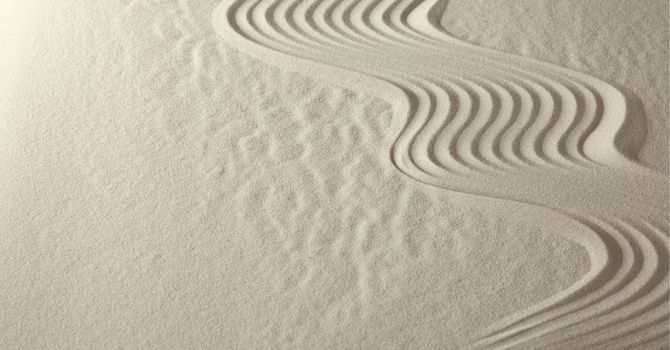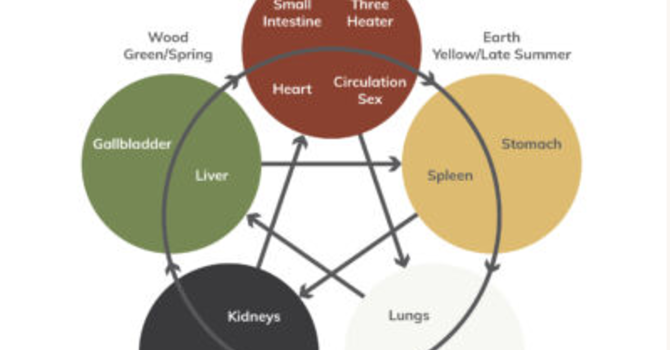
A famous excerpt from the first chapter of a famous Chinese Classical book written around 2600 BC called the Yellow Emporor’s Classic states:
At seven times seven a woman’s heavenly dew wanes;
the pulse of her Conception channel decreases.
The Qi that dwelt in the baby’s palace moves upward into her heart,
and her wisdom is deepened.
This passage describes what we formerly know as menopause. Old Chinese texts believe that women age in cycles of seven throughout their lives in which key things occur. This passage indicates that they think menopause occurs between the age of 49-55. It translates that menstruation (heavenly dew) ceases and conception will be no longer be possible. The energy that was needed in the uterus (baby palace) moves up to the heart providing a deeper wisdom or “second spring”. This is a very poetic way of explaining the mental and physiological processes that occur during menopause. The Chinese believe that woman age in cycles of 7 and the mean age of menopause was in the seventh cycle between 49-56.
A Chinese Medicine Perspective on Menopause
In Chinese Medicine Menopause is a profound and wonderful time in which a woman can use her new found energy that goes to her heart to pass on wisdom to the younger generations and she can be inspired with new found passions often leading to them giving back in some way to society. During this time if there are symptoms of menopause that we recognize in Western Medicine they can be effectively balanced and treated with Chinese Medicine to make this transitional time easier on the body and mind. I think this is a beautiful way of looking at this time in a woman’s life and is often viewed as negative in our current culture.
How does this relate in Western Medicine and what does menopause actually mean?
The definition of menopause according to most medical professionals is the abscence of vagnal bleeding for one year. For most people this occurs naturally as a progression in life and for some individuals may experience menopause earlier as a result of premature ovarian failure or from a surgical intervention causing menopause abruptly.
Leading up to menopause even in woman’s forties woman can experience a variety of symptoms for years. These can include night sweats, hot flashes, insomnia, heart palpitations, vaginal dryness,urinary incontinence, irritability, anger, depression, weight gain, fatigue and mood swings among other things. This can be a trying time emotionally for woman who have these unexpected changes and do not even recognize initially what is going on within their bodies. These symptoms can last even into a person’s late fifties. Most woman will experience some of the above symptoms and at least 75 percent of woman will experience some kind of hot flashes during this time. Hot flashes can vary in intensity and severity.
How is Menopause Treated in Western Medicine?
In Western Medicine Menopause is recognized as starting from a decline of the hormone estrogen in woman’s body. Which happens as woman’s ovaries cease their production of producing this hormone. Treatments for perimenopause and menopause in Western Medicine deal with trying to balance the declining hormones. Woman who are bleeding excessively leading up to menopause may have interventions done to make this transition more comfortable with western Medicine including birth control, surgical ablasions to reduce heavy bleeding and hysterectomies if the bleeding cannot be controlled for a long period of time.
During menopause patients may be offered hormone replacement therapy (HRT) which can be solely estrogen or a combination of both estrogen and progesterone. There can be side effects with all of these treatments and interventions that should be considered very carefully including an increased risk of breast cancer.
How does Chinese Medicine deal with Menopause differently?
First the symptoms in your body help the Chinese Medicine Practitioner you are seeing create a diagnosis specific to each person to help your body become balanced and symptom free again. The most common imbalance in menopause is what the Chinese call a deficiency in Yin. Yin which is similar to water, can become depleted in your body and it cannot hold down the yang which is like the fire aspect of your body. If the yang is not held in check a fire flares up in your body and creates the symptoms of hot flashes, night sweats and vaginal dryness from all of the extra heat.
In perimenopause, women can also experience some yin symptoms of extreme thirst, irritability, nervousness, insomnia, afternoon fevers, sweating of the palms and soles and center of the chest. It is much easier to make menopause an easier transition if you treat these symptoms as soon as they start or prevent them altogether before they start becoming a problem.
In contrast, many women experience a decrease in yang, which is like the fire aspect of our body. The symptoms include fatigue, depression, low libido, weight gain, water retention and incontinence to name a few. A lot of people have a combination of both the yin and the yang symptoms.
It is key in Chinese Medicine if you have any of these symptoms before menopause that you treat them at that time in order to make menopause less severe. If you are already in the full extreme of menopause with drastic symptoms it is not too late to change that around either, it just takes more time and effort.
What treats Menopause in Chinese Medicine?
I like to find the patient’s diagnosis then to start with acupuncture because it works so quickly at creating significant results in perimenopausal and menopausal symptoms. Acupuncture is the insertion of thin, pre-sterilized needles into specific points to create a number of physiological reactions that cause specific changes and improvements to the bodies symptoms and problems. There are specific acupuncture points to reduce symptoms of menopause that are very quick and effective. Many patients experience an immediate change in the frequency and intensity of hot flashes, night sweats and irritability after only one treatment. Chronic symptoms can take more time to get the same results.
Alternatively if symptoms of menopause are very serious or stubborn herbal medicine can also be introduced into the treatment plan. A herbal formula is creating by mixing together from 4-20 plus herbs together in order to treat each individual patient’s symptoms. The main symptoms are usually the focus of the herbal treatment and as the patient improves the herbal formula can be adjusted to treat the remaining symptoms. I choose GMP (Good Manufacturing Practices) certified herbal medicine that has no heavy metals, additives or fillers in them and come from an extremely high quality line of herbal products. Herbal Medicine is not as fast as taking a prescription medication but can be wonderful as a natural alternative to drug therapy in eliminating the symptoms of menopause.
In Conclusion
I am passionate in my practice about helping women balance their hormones and be as healthy and happy as they can be. I love the results that I have seen with helping woman transition into this stage of their life and firmly believe that once the symptoms of menopause are taken care of that this is a great and important time in life. I view this second spring as something we want to encourage our youth to embrace and look forward to especially with the knowledge that there are natural ways to transition into menopause without physical and mental symptoms that many people dread. I believe menopause can be a more positive experience for all especially with prevention and early treatment.
References:
The Yellow Emperor’s Classic of Internal Medicine by Huangdi Neijing
The Foundations of Chinese Medicine by Giovanni Maciocia
www.acupuncture.com
Dr. Jennifer Nelson
Contact Me



